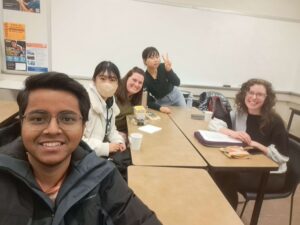For most students, college is a time when they are forced to confront real-life issues at a more intimate level than they ever have before in their lives. They might, in high school, have had discussions about issues of culture and world events, but those discussions were mainly constrained to the realm of philosophy; they had the luxury of keeping these things at an arm’s length. But college changes all that.
Relationships get more diverse. Experiences get more broad. Opportunities get more prolific. And because a college student’s world is expanding at a rapid pace, it can be overwhelming for a collegiate minister to know which topics to discuss. There simply aren’t enough opportunities to talk about everything that deserves to be thought about from a biblical standpoint.
It might be helpful, then, to consider that often there is a larger topic behind some of the more isolated ones. In other words, a student might be asking questions about a specific issue, but the real issue runs deeper than that. If that’s true, then, a person working in collegiate ministry can find some freedom in thinking about these “macro-topics”, because if we can get these “macro-topics” right, then our students will be able to rightly think about the more “micro-topics” within each one. Here are four examples of some of those big, overarching topics that can inform the other ones:
- The Reliability of Scripture
What we believe about the Bible is a cascading belief. That is, it informs everything else about our faith. Once you make a firm decision about the reliability of God’s Word, then everything else falls into focus. Once you decide the Bible is true, then you can know who God is. And once you decide the Bible is true, then you can know who you are. You can know how to make decisions, know why you exist on this planet, know the purpose of your family and everything else. Further, you can always boil any decision back to that central decision: Is the Bible true?
Because this topic determines so much else, it’s worth investing a considerable amount of time in.
- The Nature of Humanity
Here is another macro-topic worthy of discussion – the nature of humanity. This is the kind of topic that informs our thinking about all kinds of things like human sexuality, racism, how we treat the aging and unborn, and host of other things. Once we firmly establish who we are, and what we were created for, we can have that as the foundation for all these issues. Furthermore, when we establish that after the fall, humanity is fundamentally sinful, then even more issues are put into light for us.
- The Centrality of the Gospel
If we establish the validity of Scripture and the nature of humanity, then we can consider deeply the core message of Scripture and the only hope for humanity. But to be clear, this topic is not just about an initial presentation of the gospel – it’s about helping college students realize that the gospel is really the central story of both the Bible and all of history. By spending time on this topic, we are training our minds and the minds of our students to think about the gospel implications for every area of life, no matter how small.
- The Everyday Nature of God’s Will
One final macro-topic – the will of God. Surely every Christian college student has pined away at the question of God’s will, and most likely has done so in the context of big life questions:
- What will I do for my career?
- Who will I marry, if anyone?
- Where will I live?
These are no doubt important questions, but students need to have a broader understanding of God’s will than the answers to these questions. They must understand that God has revealed His general will to all of us through His Word, and they must understand that if we walk daily in His general will then we will eventually find our way to His specific will.
These are certainly not the only valuable topics to discuss with students, but they are, I believe, the kinds of things that don’t just give them answers, but train them how to think. If we can win that battle, then many of the individual skirmishes will be won as well.







 by
by